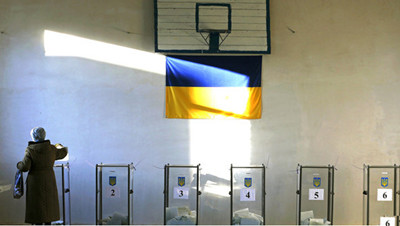乌克兰大选
Good voters, not such good guys
好马无好鞍
The poll results were promising, but the future for Ukraine is dauntingly difficult
大选的结局充满希望,但是乌克兰的未来依然扑朔迷离
TO ALL appearances, Ukraine's parliamentary election on October 26th was a triumph. Reformists mostly won and voters rebuked the far right and far left. Western allies heaped praise on the pro-European, pro-democratic results. Yet Ukraine remains troubled and deeply divided.
从各方面来说,10月26号乌克兰议会选举的结果都是振奋人心的。改革派取得了绝对的胜利,选民们也击退了极右和极左主义。乌克兰的西方盟友对于这种亲欧盟,和民主化的选举结果给予了极高的赞扬。然而乌克兰依然面临不少困难并且深陷分裂的危机中。

In an upset, the People's Front party of Arseniy Yatsenyuk, the prime minister, narrowly beat President Petro Poroshenko's bloc by 22.2% to 21.8%. This means that Ukraine will keep two power centres, as Mr Yatsenyuk seems sure to stay in office. Mr Poroshenko had hoped to win a majority and install a loyalist instead. Now the People's Front and the Poroshenko Bloc must form a coalition, probably with the third-placed Samopomich (self-help) party, led by the mayor of Lviv. The six parties that reached a 5% threshold will fill half of the 450-seat parliament (Rada) from their party lists. The rest will come from districts where deputies are elected directly and only later join party factions.
在一种惴惴不安的气氛中,代理总理亚采纽克领导的人民前线党最终以22.2%对21.8%的微弱优势击败了总统彼得·波罗申科领导的政治联盟。这意味着乌克兰将存在两个权力中心,因此亚采纽克看上去铁定会继续在位。相反的波罗申科曾经最希望看到的结果是能赢得大多数选票并且能扶持一个忠诚的支持者。现在,人民前线和波罗申科的党派必须同第三方新兴政党——由 Lviv市市长领导的Samopomich(自主联盟)建立一个政治联盟。六个赢得了进入议会门槛——5%选票的政党将用自己的成员填满其中过半的席位。剩下的席位将从各地区的直接选举并且接下来也将加入各自的小团体。
The vote reflected the western regions' power in the new Ukraine. Turnout was highest in the west, and relatively low overall at 52% (down from 60% in May's presidential election). In Lviv 70% of voters showed up, against only 40% in Odessa. In Ukrainian-controlled areas of the Donbas turnout was just 32%. Neither Crimea nor the separatist-held eastern regions voted (their 27 seats in the Rada will stay empty).
这次大选反应了西部地区在新乌克兰的影响力。相对于5月份总统大选时西部选民占据60%的情况来说,此次比例有所下降(这次仅有52%)。在Lviv 有70%的选民出席,对应的在敖德萨仅仅只有40%的选民参与了投票。在乌克兰控制的顿涅茨克地区出席率也仅仅只有32%,更不用说在克里米亚和分裂主义者控制的东部地区了。(他们在议会中的27个席位将暂时闲置。)
The Opposition Bloc, a revamped version of Viktor Yanukovych's reviled Party of Regions, got into the Rada, after finishing fourth, with 9%. The party won much of the south-east—Donetsk, Luhansk, Kharkiv, Zaporizhia and even Dnipropetrovsk. Joining them in parliament will be some 60-70 directly elected deputies aligned with the old regime. Their presence will incense first-time politicians drawn from the Maidan movement who fought hard to oust Mr Yanukovych. It will also upset Ukraine's volunteer battalions, including commanders of three powerful anti-rebel paramilitary groups who were elected.
反对党——改头换面的亚努科维奇讽刺地区党最终以第四名的身份——获得了9%的选票陈宫进入议会。他们赢得大多数顿涅茨克东南部;路甘斯克;哈尔科夫;扎波罗热甚至是第聂伯罗彼得罗夫斯克地区的选票。他们的入选将给议会带来60到70名与旧政体站在同一战线的直系代理人。这些人的出席将激怒那些费尽心思废黜了亚努科维奇(“买单”运动)之后诞生的第一批政治家。随着包括三名反政府准军事武装组织的领导人在内的一批人的介入,乌克兰志愿军陷入了深深的不安之中。
Co-operation with the Opposition Bloc, which includes Mr Yanukovych's former chief of staff, Sergei Levochkin, will be unpalatable. But Hannes Schreiber, of the EU delegation in Kiev, argues it will be “decisive to have the former ruling side in the dialogue”. Failure to do so would increase feelings of exclusion in Russian-leaning regions, where Kremlin agents continue to sow dissent. (Ukrainian security services say they detained pro-Russian “diversion groups” in Kharkiv, Odessa, Zaporizhia, Mariupol and Kiev before the vote.)
很多人都认为和亚努科维的前首席参谋长Sergei Levochkin所在的反对党合作是非常失败的。但是欧盟在基辅的代言人Hannes Schreiber坚称让前执政党的势力参与对话是非常必要的。如果不这样做,将会助长那些克林姆林宫持续散播分裂主义种子的亲俄地区的抵触情绪。(乌克兰安全委员会声称他们在大选之前阻拦了大批位于哈尔科夫,敖德萨,扎波罗热,马里乌波尔和基辅的“转移组织”。)
Even more destructive would be infighting within the coalition. Whereas the parties' broad pro-European aims are aligned, their business interests and personal ambitions are not. Horse-trading for jobs and squabbling over reforms has already begun. Mr Poroshenko and Mr Yatsenyuk have both put forward their own proposals. Mr Yatsenyuk, who takes a hawkish attitude to Russia, has declared himself the election's winner and put “restoration of sovereignty and territorial integrity” at the top of his cabinet's priorities.
事实上联盟内斗带来的危害更大。在那里虽然广大亲欧盟党派的目标是一致的,但是他们的商业和个人利益却不尽相同。关于就业和改革讨价还价般的争执已然开始。不管是波罗申科还是亚采纽克都在推行他们各自的主张。亚采纽克一直对俄罗斯采取极度强硬的态度,他声称自己是大选的胜利者并且将实现“国家主权和领土完整”列为自己执政的第一要务。
Mr Poroshenko, who has more allies among directly elected deputies, will not easily relinquish the reins. He seems determined to direct reforms from the presidential administration, where his aides have spent months preparing draft laws, with a focus on deregulation, judicial reform and decentralisation. After the 2004 Orange revolution, conflicts between the president and the prime minister plagued the government, which squandered the chance of broad change to the system. Mr Poroshenko and Mr Yatsenyuk must learn from those mistakes. “Delay with reforms is fatal for us,” Mr Poroshenko himself said.
在那些直接选举产生的代表中拥有更多盟友的总统波罗申科绝对不会轻易放弃这股力量。他似乎决心通过总统的权力进行直接改革,他的助手们花了几个月的时间来制定法律,这些新法案专注于解除管制,司法改革以及权力下放。事实上,自从2004年的橙色革命之后,总理和总统间的权力冲突一直困扰着乌克兰政府,而这种行为极大地浪费了体制改革的机会。不论是波罗申科还是亚采纽克都必须从之前的错误中吸取教训。波罗申科表示“对我们来说,拖延改革是极其致命的。”
At stake is the survival not just of the new government, but of Ukraine itself. The economy, teetering on the verge of collapse, depends on foreign aid that is linked to reforms. This week the EU promised more help. But reforms are likely only to increase the pain for people ravaged by war and facing a gas-starved winter.
不论是对于幸存的新政府还是乌克兰本身来说,现在的情况都是危如累卵。国家经济接近崩溃,全靠国际援助支撑,这种支撑还得依靠改革的成效来维系。本周,欧盟当局承诺给予更多援助。但是就目前来看,一系列改革措施只能增加人们因战争带来的痛楚,同时还得面对一个没有天然气的寒冬。
Ukraine has to contend with its rebels and with Vladimir Putin (see article). The separatist republics in Donetsk and Luhansk will hold elections on November 2nd, a vote that Kiev condemns but Moscow will recognise. Ukrainian soldiers, two-thirds of whom did not vote because they could not leave their positions, still die on the front. On their way to the polls during a freezing election day in Kiev, voters expressed only tepid hopes. “The people won't tolerate the politicians' games any longer,” said Svetlana Ischenko, 68, in the foyer of Lesya Ukrainka Gymnasium. “If we don't change now, either Ukraine will fall to pieces or Putin will take us over.” Unfortunately, she may be right.
乌克兰不但要和反政府武装斗争还要随时提防普京。位于顿涅茨克和卢甘斯克的分离派共和政体将在11月2号举行选举,即便基辅极力谴责,但是莫斯科显然会承认这一行为。接近三分之二的乌克兰士兵并未参加选举,因为他们不能离开自己的岗位,他们依然在前线牺牲。在一个寒风凛冽的日子去基辅参加投票,选民们表达出一种微弱的希望。68岁的Svetlana Ischenko在Lesya Ukrainka体育馆表示:“人们已经受够政治家们的游戏!如果我们现在还不改变,要么乌克兰彻底完蛋,要么普京将来接管我们。”即便很残酷,但她可能说出了实情。译者:曾擎禹 校对:邵夏沁













